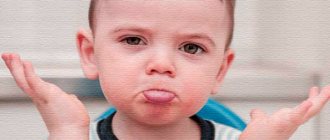Most often, speech disorders are detected at the age of 3 years, when the child begins to actively speak. Using a real example, we tell you what general speech underdevelopment (GSD) is in children, whether it is a dangerous diagnosis or not, and how you can help your child speak at home.
⠀
Speech development disorders can occur in children raised in ordinary families, and in children from bilingual families, i.e. in congenital bilinguals, when the child’s parents speak different languages.
⠀
Young bilingual children learn two languages from early childhood - the first, the main language, and the second, which is spoken less often. Therefore, speech problems in such children are most often associated with incorrect pronunciation of sounds and mixing of languages in speech.
⠀
From this article you will learn:
- what is general speech underdevelopment (GSD) in children;
- Is this diagnosis dangerous or not?
- in what cases should you sound the alarm;
- what specialists to contact;
- How can you help your child speak at home?
⠀
To make it clearer for you, we will analyze all the questions using a real example.
What is general speech underdevelopment (GSD) in children?
General speech underdevelopment (GSD) is a violation of the development of speech skills in a child. Most often, it can be detected at the age of three, when the child begins to actively talk. But OHP is not a symptom of a serious illness, but most often simply insufficient attention of parents to the child’s speech. For example, if a child says “yba”, “suba”, “dau”, and the parents do not correct him, thinking that “it will go away on its own”.
⠀
Four months ago, one of the social networks of the Kidskey online school received the following message:
⠀
“My son is 4 years old. He has been going to kindergarten since he was 3 years old, but he hardly speaks. His speech is similar to the babble of a one-year-old child. I understand it only when it is explained by gestures. My friends reassure me that boys start talking later, but I am very worried because in the kindergarten the children do not want to play with my son, he constantly cries, gets angry and even offends his classmates.
⠀
I do not know what to do. Please tell me, should I do something now or should I wait until the child outgrows it? Is it necessary to go to a specialist or can you practice speech development at home?”
⠀
It is difficult to give some abstract advice without talking to the child. That's why we invited the mother and boy for a free online consultation.
⠀
Wonderful and smiling Roma had no problems with hearing or intelligence, but he communicated with our methodologist like this:
⠀
- instead of “give” he said “yes-yes”, instead of “there is” he said “us-us”;
- instead of a whole word, he named only the root and used it to designate several words at once - “ma” - “machine”, “ba” - “drum”, “banana”, “battery”;
- he spoke the same words in different ways: “machine” - “asha”, “bibi”, “pipi”, “si”;
- I shortened complex words and phrases: “mom went to work” - “ma sya a atu.”
⠀
After the consultation, it became clear that Roma has general speech underdevelopment (GSD) of the first degree.
Speech therapists can make this diagnosis to a child if he said his first words only after 3 years or if he explains himself more with gestures. For example, instead of saying “Mom, give me some candy,” he says “give me,” and then points his finger at the cabinet where the sweets are.
⠀
Below is a table with the norms for child speech development by age . Take a look, but don’t get too hung up on this data - each child is individual and develops at his own speed.
Things to remember
To interest a child, it is best to choose interesting games that are understandable and age-appropriate, evoking an emotional response. These can be games for movement, for changing types of actions, for developing physical skills, role-playing games. For them to be productive, you need to remember a few rules.
- In classes with a non-speaking child, the parent must take an active role: he organizes and leads the game, interests the baby, and controls his condition.
- The adult accompanies the game with active speech: comments, describes all stages, encourages the child to act, and praises. An adult’s speech should be emotional, clear, understandable, calm, cheerful, and not too loud or quiet.
- All exercises or games should take place in a warm, friendly atmosphere, with frequent physical contact and constant support of the child.
- An adult must constantly monitor the progress of each game, constantly monitoring its beginning, middle and end, monitoring the child’s mood and fatigue. The game continues as long as the child is enthusiastic, cheerful and cheerful, and stops when he begins to be distracted and capricious.
In such games, special attention should be paid to what kind of speech accompaniment is “attached” to them. All verbal instructions should be simple and understandable. Poems in such games should not be very long (it is better for an adult to memorize them). Their content should be age-appropriate, without excessive figurativeness, understandable, and interesting. Your speech should be a role model: correct, without distortion, clear, calm, energetic.
There is one more important point that you need to know about when organizing activities with non-speaking children. Children master all skills acquired in play through imitation. At the same time, classes are structured in such a way that the baby learns the actions sequentially: first the simplest ones, then more and more complex ones.
The sequence should be something like this:
- simple movements (arm swings, steps, jumping);
- several simultaneous movements (walking with clapping);
- logic games with objects or toys (for example, take a car, load cubes into it, take it to the “warehouse”, unload);
- games with poetic accompaniment (playing simple rhymes);
- activities on children's playgrounds (climbing, swinging, slides);
- games aimed at teaching the correct use of objects (spatulas, buckets in the sandbox, dishes when feeding a doll).
Taking into account all these features, parents can organize developmental activities with children with delayed speech development so that they bring the desired results. It is worth remembering that the child will have to study for a long time. You need to be patient, enjoying even a small achievement. Then more significant ones will definitely follow.
When to sound the alarm if a child does not speak?
- If up to 8-9 months of life the baby is more silent.
- If a year does not respond when you talk to him. For example, if you ask “where is the chair?”, and he does not turn his head towards where the chair is. And to attract your attention, he often cries.
- If at 1.2 - 1.6 years the child does not distinguish familiar objects by ear and cannot show them in the picture. For example, you ask him to show where the bed is, but he cannot show it either in the room or in the picture.
- If at 1.5 - 2 years old the child does not understand how to fulfill your simplest requests. For example: “Give me a cup from the table,” “Take the little soldier and put him in the box.”
- If at 2–3 years old the child does not speak simple sentences. For example: “Mom, I want to eat”, “Dad, here.”
- If at 3–4 years old a child cannot speak in sentences. For example: “Dad came home from work,” “The dog is lying under the table.” He also pronounces most sounds incorrectly.
Is OHP of the first degree dangerous?
OHP itself is not dangerous, but if correction is not started in time, the consequences can be serious. Speech therapists and neurologists say that up to 3 years of age there is no need to worry. But if your child is already 3 years old and does not speak at all or only said his first word at this age, this may be a signal of delayed speech development.
⠀
If you continue to ignore the problem, it will get worse. Against the background of underdevelopment of speech, mental development may be disrupted: thinking will become inhibited, concentration and memory will deteriorate, and coordination of movements will be impaired.
⠀
The child’s performance at school will drop, self-esteem will decrease and complexes will appear, he will become withdrawn and prone to depression. To prevent this from happening, it is advisable to identify the problem as early as possible and take action.
Why does a 3 year old child speak poorly or remain silent?
Experts identify a whole range of factors that can lead to poor development of the speech apparatus in a child at this age. Reasons to consider include:
- Physiological disorders. If your baby has difficulty speaking, this may be the result of hearing impairment or general developmental delay. You should show the child to a doctor and carry out the necessary examinations that will help identify physiological deviations from the norm.
- Psychological trauma. The presence in a child’s life of a negative moral, psychological and emotional environment, as well as a constant state of stress, can contribute to isolation and reluctance to explore the world around him, including through speech function.
- Overprotection. Features of the educational process in which parents deprive the child of the opportunity to self-determinate, express his feelings and desires. If a baby constantly receives help without effort or verbal description of needs, he lacks the motivation to use speech, because gestures are quite enough.
- Lack of attention. The constant employment of parents and the lack of quality communication with the baby lead to the child’s isolation and insufficient level of development.
- Gadgets. Spending an excessive amount of time with a tablet, phone, TV or laptop by a child has a negative impact on speech development. The information is transmitted automatically and does not require a verbal response from the baby, so he just needs to silently press the necessary buttons.
It should be remembered that only specialists can correctly identify the real reason for silence or their complex. And if a child does not speak well at the age of three, maximum effort should be devoted to resolving this issue, because in the future it will be much more difficult to develop speech.
Who should you contact to identify general underdevelopment?
If a child does not speak at 4 years old, it is better to show him to several specialists at once:
⠀
- speech therapist-defectologist - will assess the severity of the speech disorder and suggest the direction of correctional work;
- ENT specialist - will help make sure that hearing is normal;
- a neurologist - will examine the child, get acquainted with the baby’s development chart to exclude organic damage and, if necessary, prescribe appropriate medications.
⠀
Often, a consultation with an experienced speech pathologist-speech pathologist is enough to determine ODD and begin correction, as in the case of our student Roma.
⠀
But if the speech therapist still recommends visiting other specialists, then you should listen.
What to do if a child is diagnosed with first degree ODD?
We gave Romina’s mother 10 basic recommendations on how to develop a child’s speech at home. The first four relate to communication, and the next six work on speech development:
Watch your speech
Don’t babysit with your child, pronounce words, phrases, and sentences clearly. Watch your pace - don't speak too fast and not too slow. Children always follow the example of their parents.
Don't use difficult words when talking to your child
Phrases should be simple and understandable. If, for example, you are reading a book where you come across unfamiliar words, stop and explain the meaning to your child.
Ask simple, specific questions and don’t rush into answers.
For example: “Are you cold?”, “Do you want to eat?”, “Does anything hurt?” etc. It will be easier for the child to answer clear questions.
Don’t scold for speech errors, but correct them gently
For example, a child said “paishou”, and you carefully said to him: “Bunny, he went to speak correctly.”
If there are other people around at this moment, say so that no one can hear you. Then the child will not be embarrassed.
Develop fine motor skills of your hands
Allow your child to dress and tie his own shoelaces; often let him sculpt, paint, draw, assemble mosaics and construction sets. The better the motor skills of a child’s hands are developed, the better the brain works, and the faster speech normalizes.
Do breathing exercises with your child
The child will be able to speak clearly, for a long time, without stuttering or stuttering.
Develop phonemic awareness
Phonemic hearing helps the rapid and correct development of oral speech through the ability to hear and distinguish sounds. Find examples of games and simple exercises on how to develop phonemic awareness here.
Do articulation exercises
Such gymnastics is aimed at training everything that helps us speak: the muscles of the face and mouth, nose and voice. A developed articulatory apparatus will help the child immediately pronounce sounds correctly.
⠀
This includes exercises such as “pipe duck”, “fence”, “horse”, tongue massage with a toothbrush, etc. You can easily find all these exercises on YouTube.
Control how much time your child spends on gadgets
The child should spend more time in outdoor games. For example, at home you can also jump, play tag, and build a house out of chairs, pillows and blankets.
Diagnosis differentiation
A 3-year-old child does not speak for various reasons. To properly provide assistance, you need to conduct a comprehensive examination. This approach will allow you to correctly determine the structure of the defect and identify the root cause of the delay.
First of all, hearing problems are excluded. A decrease in perception may not be critical (the child reacts to loud sounds, but does not distinguish speech). An audiogram is required. Hardware techniques provide reliable data on the state of hearing.
Children also refuse to talk for psychological reasons. Autism can have a variety of impairments.
The main ones:
- stereotyping;
- refusal of eye contact;
- auto-aggression.
The basis of the defect lies not in problems with speech, but in a disorder of the communicative function of the psyche. The first and main specialist for a child is a psychologist.
With cerebral palsy, paralysis and paresis of varying degrees of severity often occur. In this case, the basis of the problem is organic brain damage. To successfully overcome the problem, you need the help of a neurologist.
Parents do not understand why they are sent for consultation to a psychiatrist. In fact, you should not be afraid of such a doctor. Its task is to identify intellectual disabilities and mental illnesses.
With mental retardation (MDD), problems are noted not only with speech, but also with other functions: thinking, memory, skills, etc. In early preschool age, it is not always easy to distinguish this diagnosis from mental retardation.
In cases of mental retardation and other intellectual problems, a mental retardation disorder is not diagnosed. Only SNT (systemic speech underdevelopment), the defect is based on organic brain lesions.
In rare cases, a disease such as selective mutism is diagnosed. It can be easily confused with ZRR. With this disorder, the child does not speak at all, but he can speak. The disorder is based on psychological problems. Preschoolers can talk with a limited number of people.
With psychosomatics, the root cause of the problem lies in psychological problems. Stress, complexes, and trauma can cause speech negativism, and therefore the child does not speak.
Before starting treatment for something, you need to get advice from several specialists at different levels. They will allow you to exclude different diagnoses.
If someone from your environment recommends not to worry and let the problems go away on their own, then this is bad advice. If you have speech disorders, you need to help your child as early as possible - this way you can achieve results.











